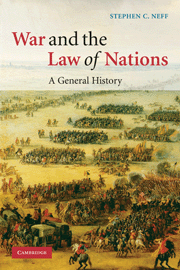Book contents
- Frontmatter
- Contents
- Preface
- List of abbreviations
- Introduction
- PART I War as law enforcement (to 1600)
- 1 Ares and Athena
- 2 Loving enemies and hating sin
- PART II New forces stirring (1600–1815)
- PART III War as state policy (1815–1919)
- PART IV Just wars reborn (1919–)
- Conclusion
- Bibliography
- Table of cases
- Table of treaties
- Index
2 - Loving enemies and hating sin
Published online by Cambridge University Press: 30 July 2009
- Frontmatter
- Contents
- Preface
- List of abbreviations
- Introduction
- PART I War as law enforcement (to 1600)
- 1 Ares and Athena
- 2 Loving enemies and hating sin
- PART II New forces stirring (1600–1815)
- PART III War as state policy (1815–1919)
- PART IV Just wars reborn (1919–)
- Conclusion
- Bibliography
- Table of cases
- Table of treaties
- Index
Summary
Let us do evil, that good may come.
St PaulThe real evils in war are love of violence, revengeful cruelty, fierce and implacable enmity, wild resistance, and the lust of power, and such like; and it is generally to punish these things … that, in obedience to God or some lawful authority, good men undertake wars.
St AugustineThe idea of a world living in peace under the rule of a universal law of nature was one of the most far-reaching in human history. But it was far from being widely held. In fact, in the ancient world, it appeared only in the two ancient civilisations previously noted: China, under the auspices of Confucian thought; and Rome, under stoic influence, reinforced by Christian ideas. In many parts of the world, such as sub-Saharan Africa, the dominant view remained one of endemic hostility between neighbouring states. Islamic society represented a kind of mid-way position between these extremes. It held relations within the Islamic fold to be peaceful, without regard to race, language or cultural heritage, while positing ceaseless hostility against the infidel world outside. This point is often unappreciated because of Islam's famous, and largely deserved, principle of toleration of individual members of other faiths who dwelled within the Islamic fold. When it came to relations between Muslim and infidel states, however, the picture was importantly different. There, an unrelenting hostility was the norm.
- Type
- Chapter
- Information
- War and the Law of NationsA General History, pp. 39 - 82Publisher: Cambridge University PressPrint publication year: 2005



